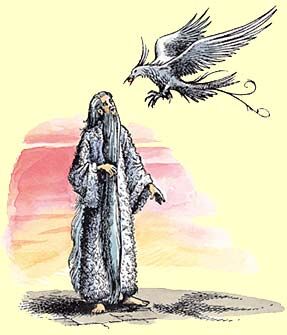Spiritual Sunday
Today’s Old Testament reading puts me in mind of a Narnia episode that has long puzzled me. It’s not an exact match but close enough.
The passage is Jeremiah 1: 9-10:
Then the Lord put out his hand and touched my mouth; and the Lord said to me,
“Now I have put my words in your mouth.
See, today I appoint you over nations and over kingdoms,
to pluck up and to pull down,
to destroy and to overthrow,
to build and to plant.”
The passage is similar to Isaiah 6: 5-10, which is the one directly connected with the Lewis episode. Isaiah laments that he cannot be a prophet because he is a sinful man, at which point God—or in this case one of God’s angels—again purifies the mouth of one who will prophesy:
“I am doomed, for I am a sinful man. I have filthy lips, and I live among a people with filthy lips. Yet I have seen the King, the Lord of Heaven’s Armies.”
Then one of the seraphim flew to me with a burning coal he had taken from the altar with a pair of tongs. He touched my lips with it and said, “See, this coal has touched your lips. Now your guilt is removed, and your sins are forgiven.”
Then I heard the Lord asking, “Whom should I send as a messenger to this people? Who will go for us?”
I said, “Here I am. Send me.”
In Voyage of the Dawn Treader, Prince Caspian and his crew have reached “the beginning of the end of the world.” There they meet an old man named Ramandu, who reveals that he was once a star. The man and his daughter sing in the dawn, at which point this happens:
Then something seemed to be flying at them out of the very centre of the rising sun: but of course one couldn’t look steadily in that direction to make sure. But presently the air became full of voices—voices which took up the same song that the Lady and her Father were singing, but in far wilder tones and in a language which no one knew. And soon after that the owners of these voices could be seen. They were birds, large and white, and they came by hundreds and thousands and alighted on everything; on the grass, and the pavement, on the table, on your shoulders, your hands, and your head, till it looked as if heavy snow had fallen. For, like snow, they not only made everything white but blurred and blunted all shapes. But Lucy, looking out from between the wings of the birds that covered her, saw one bird fly to the Old Man with something in its beak that looked like a little fruit, unless it was a little live coal, which it might have been, for it was too bright to look at. And the bird laid it in the Old Man’s mouth.
Later Ramandu explains to Lucy what has happened:
“I am a star at rest, my daughter,” answered Ramandu. “When I set for the last time, decrepit and old beyond all that you can reckon, I was carried to this island. I am not so old now as I was then. Every morning a bird brings me a fire-berry from the valleys in the Sun, and each fire-berry takes away a little of my age. And when I have become as young as the child that was born yesterday, then I shall take my rising again (for we are at earth’s eastern rim) and once more tread the great dance.”
This vision of becoming a child again arises from Lewis’s deep longing to return to childhood, a longing that resulted in a splendid series of children’s books. Lewis blends that longing with his belief in Christian resurrection, which becomes clear later in Dawn Treader when Aslan appears as a lamb—and a lamb, furthermore, serving a fish breakfast to the mariners (like the resurrected Jesus did to the disciples). In the last book in the Narnia series, Lewis takes his fantasy and merges it with Christian heaven.
For the moment, however, let’s end today’s entry with Lewis’s delightful vision of Old Testament prophets as retired stars who get younger every day.


